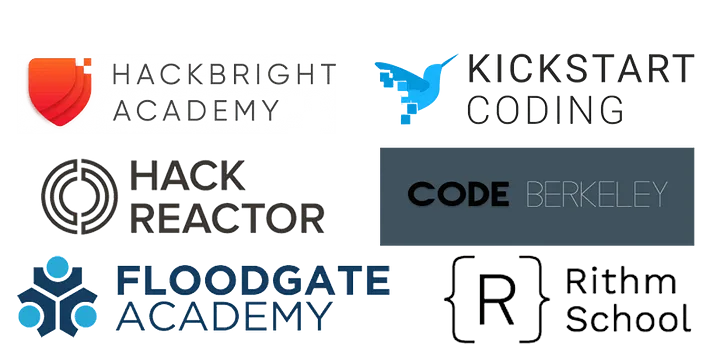On May 8, 2018, I partnered with TechHire Oakland to host a panel at the Kapor Center featuring various non-traditional coding programs from around the Bay Area in order to allow Oakland and other East Bay residents to learn about some of the local opportunities available to learn to code. Participating programs included Code Berkeley, Hack Reactor, Hackbright Academy, Kickstart Coding, and Rithm School. You can find all the resources we shared and a link to the slides at: bit.ly/oaklandcodes.
In addition to each of the programs presenting their ‘secret sauce’, Hackbright Academy announced their arrival to Oakland! They’re currently accepting applications for the first Oakland cohort. They also announced two $8,000 scholarship opportunities for Oakland students.
Kickstart Coding announced that it launched it’s first Oakland cohort on May 7, 2018! Their program is part-time and much cheaper than most bootcamps. You can take each course component as a standalone or commit to the whole series.
Rithm School announced it will be working with the Kapor Center to offer one half-off scholarship to an Oakland resident!
Through my work on Hack Reactor’s Scholarship Advisory Board, we’ll also be giving two full-tuition Hack Reactor scholarships to two East Bay folks of color who get accepted into Hack Reactor’s program this Fall.
While the Hackbright scholarship info can be found on their website, stay tuned for more details on the Kapor Center website on how to access all the other scholarship opportunities just mentioned.
We had an amazing group of program alumni talk about the benefits and challenges they faced in their coding bootcamps.


Here are some of the key takeaways I got from speaking with program staff and graduates:
- Know thyself.
Why do you want to learn to code? Do you best learn independently or do you need more mentoring support? Do you preference an all-female or all-person-of-color experience? Do you have children or have a schedule that requires you to have a flexible learning structure? Figuring out your pain points and must haves is the first crucial step.
2. Do your research.
After you have gotten a clear understanding of what your needs, expectations, and pain points are, really get to know your program options. Visit programs in session. Speak with instructors and program alumni. Talk to companies who have hired program grads. Go to program graduations to see the types of products students create. Take your time to pick the right program for you.
3. It can be tough to get that first technical job (especially in the Silicon Valley) — so, hang in there.
Some folks got a technical job quickly after bootcamp. For others, it took 8 months or even longer to get a position. Others used their supplemental learning to do freelance work or started their own company. Be creative in exploring job opportunities, and hang in there!
4. A program’s network and mentorship value can make the difference for a positive program and job search experience.
Some programs provide multiple mentors for one student. For one grad panelist, this support was invaluable when the job hunt too much longer than she thought. Other programs have one mentor or job coach supporting many students. Regardless of what the program you choose offers, work your networks to increase your chances of landing that first job. There are lots of technical networks available. Check out the bit.ly/oaklandcodes resource to see a few, like /dev/color or Women Who Code.
5. The money problem is real.
Think carefully through the various financing options you’re presented with. At some point, money will have to be paid back, so plan accordingly. Save. Consider crowdfunding campaigns. Look for scholarships. If the cost is too high for your budget, know you have many other opportunities, like…
6. Don’t forget your local community colleges.
Berkeley City College is one Bay Area community college that has launched it’s in program, Code Berkeley, to address this program. While some of the biggest bootcamps cost $20K, you can take 3 semesters worth of courses at Code Berkeley with a similar content structure for a little over $400. So, don’t sleep on what community colleges can offer to help you get the technical role you desire.
The bottom line is there are SO many options, including some amazing free ones like freecodecamp.com (amazing online platform with in-person meet-ups all over the country), so choose what’s best for you!

